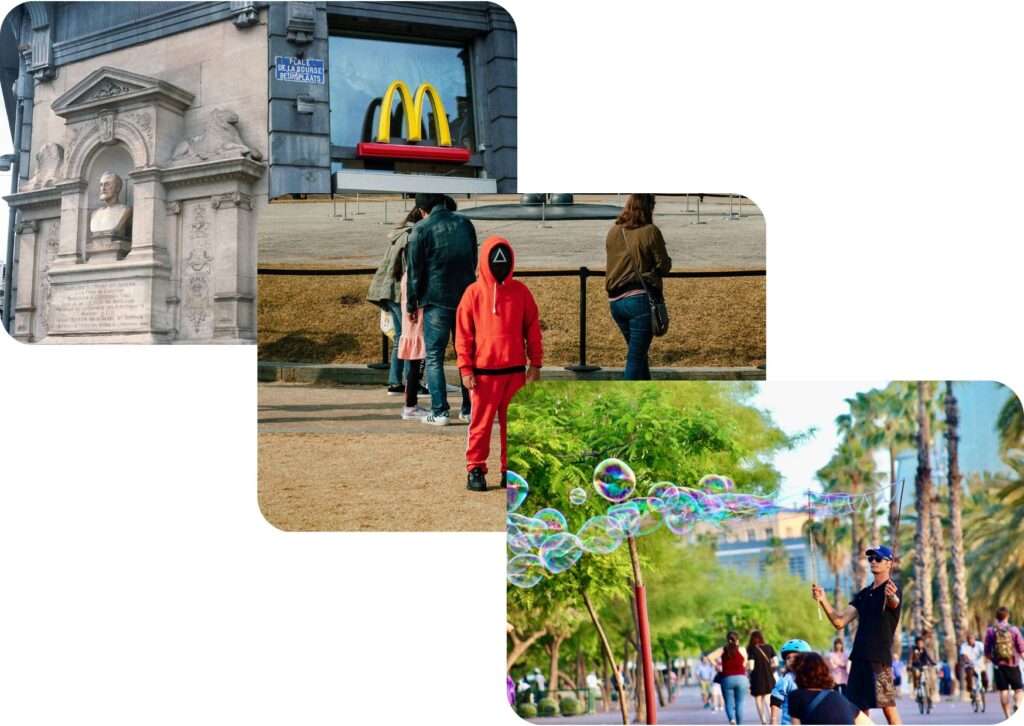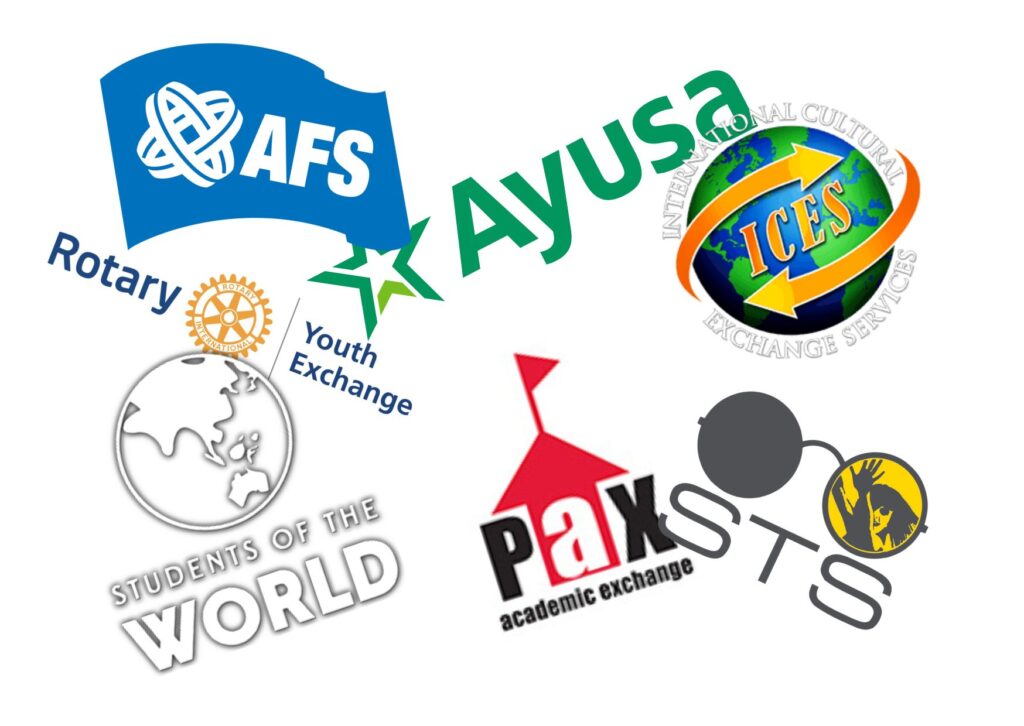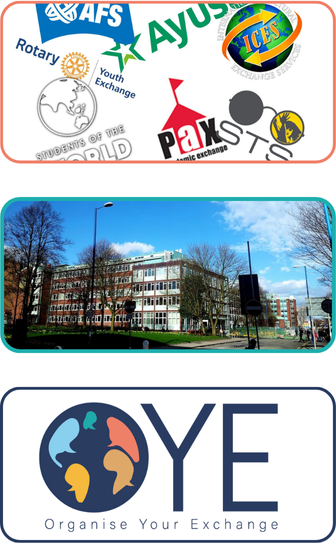High school exchanges are among the most exciting and rewarding experiences you can have, offering a deeper understanding of the world and building independence
Step outside your comfort zone and learn to be more independent. Organising an exchange helps you develop planning and management skills that will benefit you throughout life.
High school is the perfect time to experience an exchange—you're ready for new responsibilities but still free from the pressures of adult life. This could be your first chance to explore a new place on your own.
Build friendships with people from around the world, opening doors to exciting travel and cultural experiences. These friendships can create lasting opportunities for adventure.
Employers value skills like tolerance, confidence, problem-solving, and international experience. An exchange gives you the chance to gain all of these qualities, making you stand out in the job market later.
Experience life from a different perspective and gain a deeper understanding of the world. You'll see how people are both unique and connected by common values.
Your exchange will be full of fun experiences with your host family. From trying new foods to exploring local customs, you’ll create memories that will last a lifetime.
Global trade, air travel, and the internet have made the world feel smaller. You can grab the same McDonald’s burger in almost any country, binge-watch Squid Game like millions of others, and even many high school students can afford to hop on a budget flight for a weekend in Barcelona or Dublin.
But does eating a double cheeseburger teach you anything about American culture? Does Squid Game really reflect the values of everyday South Koreans? And how many of the 32 million tourists visiting Barcelona each year actually have a meaningful conversation with a local?
Real cultural understanding takes more than a snapshot or a quick visit. It takes time, curiosity, and a willingness to explore differences. Getting past language barriers or unfamiliar customs can be difficult in the beginning.
The good news? For those who are ready to put in the effort, there are now many ways to truly connect with another culture. Organise Your Exchange is here to be one more way—offering a unique opportunity for high school students and their families to create their own meaningful exchange experience.

While there are some other ways, such as via networks like the Rotary, the majority of all high school exchanges are organised through an agency or by the schools themselves.

Agency-organised exchanges are managed by an agency. There are regular for-profit companies and large international not-for-profit associations. Generally, organisations have local offices in the countries they offer exchanges for.
They mostly organise longer exchanges, from a few months to a year, during which the exchange student stays with a host family and attends a local high school as a regular student.
There is usually no reciprocal exchange, so no student from your exchange country is staying with your family.
It is the most common long-term and also the most expensive option.

School-organised exchanges are another common type of exchange. Teachers or administrative staff from both schools organise the exchange together.
These exchanges are often linked to specific courses, such as when students from a German class go to Germany together. Teachers usually go with the students and the students might join regular classes or have a special cultural program organised by their teachers and the host school.
Students stay with volunteer host families, and there is usually a reciprocal element. So if student A goes on exchange to school B and stays with family B, family A will be asked to host an incoming student from school B later. The student from school B is often not the same student as the one from family B.
To help you get a better idea of the different exchange options, we’ve compared agency, school, and OYE exchanges

Long-term exchanges organised by an agency are by far the most expensive option. For example, with most agencies a full-year exchange from the Netherlands to Spain costs about €13,000. It can easily be twice as much for a popular country like the USA.
Of course this fee has to cover costs for the whole duration. However, the high cost means that it is not accessible for many students and their families.
Exchange programs organised by schools are much cheaper. These are usually shorter trips, planned by teachers for groups of students. In Europe, they are often supported by Erasmus+ grants from the EU.
One of the key ideas behind Organise Your Exchange is that travel and cultural exchange do not have to be expensive to be amazing.
Because you are doing the planning yourself, you can use OYE to organise an affordable exchange. Many great cultural activities, such as celebrating national holidays, visiting beautiful parts of a city or nature, or cooking traditional food, are either free or cheap to do.
The main costs will likely be travel, which is cheaper if you plan ahead, and possibly insurance. You can check out some examples of typical exchange costs in the FAQ under FAQ for parents.
Any exchange takes time to organise and is probably one of the major events of that school year. There’s the research into available options, the application process, preparing your suitcase to live abroad, etc.
School-organised exchanges are likely to require the least effort to prepare. Usually, the travel, activities, and administration are organised for you by the school.
Agencies will similarly take over much of the organisation of an exchange. However, depending on the agency, they might not organise things such as international travel or insurance. One of the main selling points of agency-exchanges is that they organise your school attendance during the exchange and find and screen the host family.
With Organise Your Exchange, you will organise your exchange from A to Z. While this will of course require a bit more work from your side, there’s no need to panic. OYE will provide you with all the tools, guides and checklists you need to organise the perfect exchange. You can get a better idea of the steps involved by looking at these example timelines.
School-organised exchanges tend to be the least flexible. The school will generally plan out the entire program for you, with no possibility to make choices about the dates, host family, or activities.
When going with an agency, you are free to choose the right program for you. However, it’s common that you cannot choose your school nor your host family, or even the area you will go to in your chosen country.
With OYE, you are mostly limited by the rules of your country and school (learn more on the country profiles page). If your school or country does not allow you to go during school time, or does not allow your exchange buddy to attend your school, your only option might be a vacation-time exchange.
You can also not choose the precise location or the family for your exchange. However, the matching process is designed to give you some control by taking into account your most important preferences. (Learn more about creating your profile here)
Where OYE really stands out is that once you’ve signed up and have been matched, your family and the exchange family can plan the exchange exactly as you like.
The idea of Organise Your Exchange came in part from the fact that the restrictions on existing types of exchanges make them unavailable to many students.
Agency-organised exchanges are too expensive for most families, especially in countries with relatively lower incomes.
By planning ahead, setting realistic expectations, and organising low-cost cultural activities, an OYE exchange can be done even on a low budget.
School-organised exchanges are often not organised at all. If your school does organise them, it is common that only a part of the students can participate in them.
By putting in the work to organise it yourself instead of relying on the school, an OYE exchange should be possible regardless of your school or academic situation.
For most students going on an international exchange, the goal is to get to know the culture of the country. The degree to which this happens depends on many things, such as
In terms of really getting to know a country, it’s hard to beat a full-year exchange organised by an agency. You will be learning the language, making friends in- and outside of school, and participating in many cultural events and excursions.
School-organised exchanges on the other hand can have some downsides when it comes to cultural exchange. Because you’re going with a small group of students from your country, there is a tendency to stay in your comfort zone, together with your classmates, instead of really engaging with the host-school students. Also, activities and excursions are often organised by the teachers that came with you, which could make it feel more like typical tourism than a real immersion.
With Organise Your Exchange, the focus is on cultural exchange and a meaningful connection with the people you meet:
Student safety is always a top priority when organising an exchange, whether through a school, agency, or a service like Organise Your Exchange. While we share this commitment, OYE takes a unique approach due to the small scale of the company and the particular service we offer.
Large agencies, with their resources, often provide extensive support systems. They typically offer pre-exchange orientation sessions, conduct interviews with students and their families, and provide ongoing guidance once students arrive in their host countries. During the exchange, local staff or volunteers can be reached, and there’s usually an emergency hotline for immediate assistance.
Schools, on the other hand, usually send teachers or staff to accompany students, keeping them in groups and staying directly responsible for their safety throughout the trip.
When you organise an exchange with OYE, responsibility for the students lies with the parents of both families throughout the entire experience. Our goal is to help you build trust and establish clear agreements between the families, ensuring that everyone feels confident and prepared when the exchange begins. You can read more about how OYE contributes to a safe and fun exchange here.
Every high school exchange is a valuable learning experience. You’ll deepen your understanding of another country and its people through firsthand interactions and planned activities. Living with a host family helps you become more adaptable and open-minded, and any exchange is a fantastic way to practise your language skills.
However, the extent of what you learn can vary depending on the type of exchange. School-organised exchanges, for example, are often shorter and done with a group of your class-mates and teachers, which can limit the depth of your experience and opportunities for improvement.
A long-term exchange through an agency offers more opportunities for growth. Spending extended time in a foreign country, especially when you’re on your own, will greatly improve your independence, adaptability, and language skills.
What sets an OYE exchange apart is that you’ll develop all these skills—and more. One of the unique benefits of OYE is the chance to gain practical skills by organising the exchange yourself. You’ll learn how to manage a large project, communicate effectively with schools, parents, and host families, plan activities, and navigate travel and administrative requirements.
These are the kinds of real-world skills that modern employers value, and you’ll also be able to use them in planning future travel or other projects.
To guide you through the process, OYE provides a step-by-step exchange playbook that covers everything from start to finish.
Explore the exchange countries
OR
Prepare for signing up to OYE

Organise Your Exchange is a platform that allows high school students and their families to organise their own cultural exchange
Info in:
Sign up to receive updates about the platform, countries, or offers
2026 Organise Your Exchange
We use cookies to provide you with the best experience. We only use Cloudflare cookies to protect our website, and Google Analytics (GA) cookies to anonymously track how users use the site. You can easily opt-out of GA with this official plugin.
By continuing to browse, you agree to our cookie use as described in the Privacy Policy